-
September 03, 2007, 12:18 PM
#1
 [IB AAR] The Last of the Romans
[IB AAR] The Last of the Romans
This is to introduce a new AAR - one which has been requested by the more perverse among you - and which follows the desperate struggle of the remains of the Roman Senate now exiled to Carthage to rebuild and reconquer the empire of Rome. As you can see, I am ever addicted to epic and forlorn struggles . . .
House Rules:
Due to the number of surviving generals in Carthage (11 all told!), I will try to play them in character according to their traits. Any literary efforts will attempt to revolve around that stipulation.
As this is an alternative 'history', I will still play it as realistically as possible (as though these Romans were really the last of the Western Roman Empire in 433 AD) and so will strategize according to what these survivors would have tried to do in the period.
Settings will be H/H - although I can never work out if that is the best setting to play IBFD on . . .
I will not start a war with ERE or Roman Britain.
I will recruit and deploy all military assets according to the dictates of the Notitia and late Roman lists, after Phil Barker, AHM Jones, and Pat Southern but not Arthur Ferrill.
Scripts are off.
All battles will be fought by me - no auto-resolve. Ever.
Spies and Diplomacy will be used to full advantage in building allies and opening gates, securing assassinations, etc.
Other rules as occur on the hoof!
The first post will be tomorrow after I finish work (3pm Greenwhich Mean Time) and before Dr Who starts (7pm). Bring tissues because I think this is going to be ugly . . .
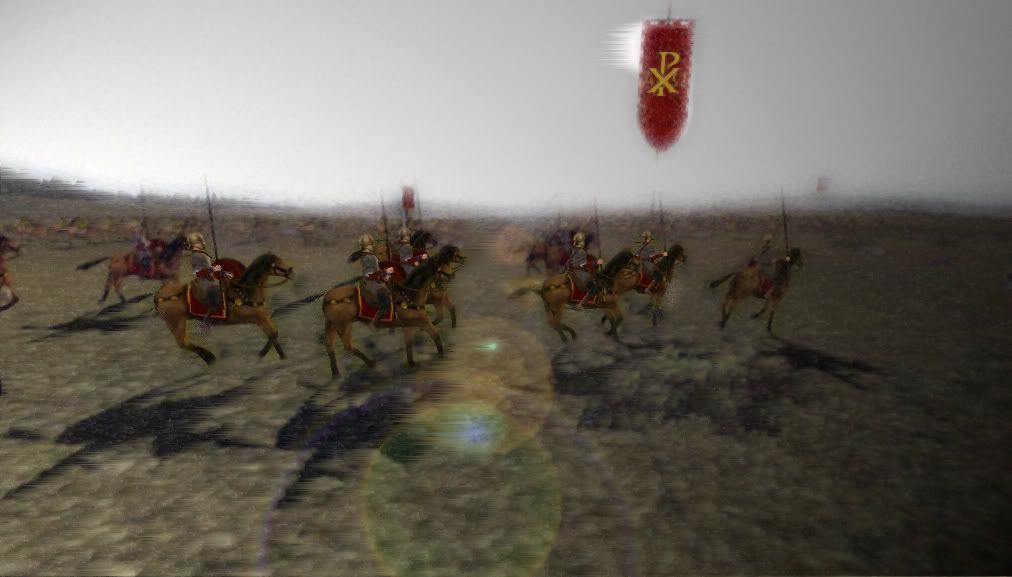
-
September 03, 2007, 12:34 PM
#2
 Re: The Last of the Romans - AAR
Re: The Last of the Romans - AAR
Aw yeah!!!! 
I'm going to need about five gallons of popcorn for this!
-
September 03, 2007, 01:35 PM
#3
 Re: The Last of the Romans - AAR
Re: The Last of the Romans - AAR
-
September 04, 2007, 11:18 AM
#4
 Re: The Last of the Romans - AAR
Re: The Last of the Romans - AAR
Preface
To those of you unfamiliar to the crazy background to this AAR, some words here will set the stage, as it were.
While playing 'The Lost Expedition' AAR, I allowed the rest of the WRE to stumble on towards its inevitable doom auto-resolving everything and not caring about what happened. My only interest was ensuring that enough of the empire survived so that I could play the Roman army marching across the 'roof of the world'. Anyway, to this end, I gathered several surviving generals in what was left of the WRE, Carthage, sure that they could survive anything the by now bored Vandals could throw at them. And it worked.
Now that the 'The Lost Expedition' AAR is over ( ) - I have a unique situation in hand and have decided (with some urging) to play out this scenario to see what happens.
) - I have a unique situation in hand and have decided (with some urging) to play out this scenario to see what happens.
So I will resurrect an alternate Roman history and allow Carthage a new Imperial dawn.
As this is outside known history, I cannot compose it as I did the 'Orcadian Chronicles' and so I will cast this tale in the form of an official history of this new imperium, a sort of panegyric, or epic, suiting the form to the theme. It means that on occasion it might get a little wordy so I apologise for that but I love writing and if I get carried away too much I am sure you will forgive me!  Uhh, right?
Uhh, right?
-
September 04, 2007, 11:28 AM
#5
 Re: The Last of the Romans - AAR
Re: The Last of the Romans - AAR
Amid the Ruins of Byzacena

This Being the Panegyric of the Augustae Romanoi Africanae
It is with bitter words that this story proceeds and like a weary march which knows no rest and fades into the obscurity of a dim and forgotten horizon so, too, will this vanish into its own mists. Mists which obscure as much as they mercifully hide.
This world is old.
These men who stand now upon the crumbling walls of ancient Carthage know it. Their swords have trailed through most of it; from the deserts of the Thebaid and the Upper Nile where the raiding Blemye drift around the ruins of Aegyptian temples like shades from the underworld, to the cracked marbles of this, old Carthage, which even Scipio himself could not erase despite the black words of the learned Senator, and where even now the echoes of Hannibal (watch out child for he will sneak even unto the walls of Rome!) catch at your ears as you scan the distant tracts south into the interior, and to the dusty roads which lead always east to the great ancient satraps of Persia and Parthia and the ever-circling horsemen clad in glittering mail and the war-elephants which rise up out of the plains like armoured galleys, to the misted forests which fringe the great Rhine and Danube, within which glower always the eternal masks of the Getae and the Germans, old Varus’ bane, to the distant shores of the White Island, Britain, cut in twain by the Long Wall, crowded with its groves of holly and oak, where once the Druids sacrificed to dark and mysterious gods who adored nothing more than the severed head, to the old cities rotting now in the sand and dust - Babylon, Thebes, Knossos, Troy and Megiddo - and finally to the empty ramparts and wind-swept turrets of the abandoned forts of the old eagle - home now only to mongrel dogs.

All these have rested in the gaze of these tired men now standing upon the marbled walls, their hands worn and scarred from the long toil of flight. And to them is felt the ancientness of it all. A world riddled with the ruins of civilisations which drifted underfoot like the bones of the fallen whose boundary has only ever been time and memory. And these men, these bitter souls, lost from their sacred home, know that these bones rest on even older debris gone now in the mists of myth and memory. Older than the fall of Atlantis, that ideal of Plato, and the shadow-memories of the Golden Age when Titans ruled this earth. Even to that murky time in which man held not dominion nor precedence but strove merely with other forms which wrapped themselves in a Stygian darkness as foul as the serpent’s breath. This the Aegyptians understood and sought to warn all about but to no avail.
These bitter and tired men know all this with a wisdom wrought from pain and toil as they stand upon the marbled walls with their purple cloaks riding high in a dry wind which comes out of the sea to the north, where once lay Eternal Home, Rome itself, amid the mighty hills and gold-clad palaces. And in their hearts, one word lies riven like a wound, a canker, and that word is exile.


Alone, upon the walls, on the edge of an ancient city, on the edge of exile, in the last province of old Rome, on the bastions of her old foe, these men, all of noble blood and bearing lineages back to the days of kingship itself, feel the pain of that single word twist in their hearts and not a man among them does not keen for the lost world of Rome like the death of a mother long known.
For there have been no refugees from the west and from across the sea for over a month now and these men know that the barbarians with sea-gray eyes and blond hair hold dominion over all Africa and the seas west of Greece and Alexandria. They know also that the New Romans have retreated to their havens and harbours around the Peloponnese and the Illyrian coves, wounded and exhausted from the great naval expeditions that had come to nought, wrecked by storm and treachery. Vandal galleys cut the waves with bloody prows and Vandal hordes roam the old provinces of Numidia and Mauretania leaving only desolation in their wake. Old Carthage waits like a poor dog for the return of its master in vain. Nothing and no one is coming either from out of the seas or from out of the old roads which run west and east.
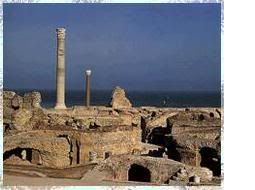
These men are all alone wrapped up in their wide cloaks and their bitter memories which coated their tongues like ash. To them falls the fate of being the last of the Romans, the old Romans, in whose blood ran the memories of Actium, Gergovia, Argentoratum, Antigoneia and the Caudine Forks. They gaze out across the wide sea to the unseen lands of Italy all now lost and understand what it is to lament.
But it is ever the Roman way to turn defeat into triumph and it is ever the Roman genius to wrestle out of despair the grim fist of resolve and so these men, Senators all, and once commanders of legions and vexillations, and honoured to stand in the Presence of the Augustus himself and adore the sacred purple, when the sun sets in a gloom of dusk and twilight, turn their backs upon the sea and descend into the crumbling city that was once the Nemesis of Rome, and make a vow that out of this city would arise the old goddess again and on her shoulder would rest the tawny wings of the Roman eagle reborn.
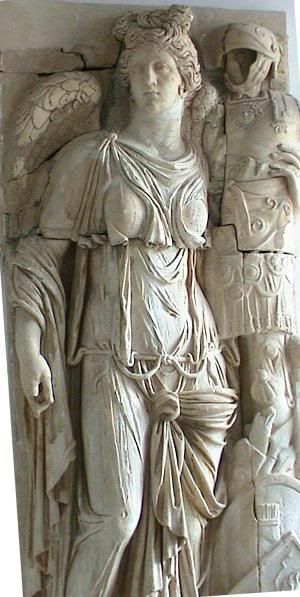
The last of the Romans, that night in the ancient baths, long since a wonder of the world, drew deep in fervent discussion and make plans for a new dawn in all the senses of that word. As the oil lamps burn low and the waters cool, as the slaves drift away in the shadows and only the soft hymns of the Christians can be heard from the nearby basilicas, these men, steeped in Caesar, Virgil, Seneca and Ammianus, whisper hard words to each other, as they pass honeyed wine and olives like a sacrament.


With the dawn came a fresh wind from out of the north, greeting the city like a lost brother, and other men on these walls, thin sentries in torn mail and with blunted spathas, frown in this wind and look to each other and for the first time in many a day find the courage to smile . . .
Rome would arise again.

Last edited by SeniorBatavianHorse; September 04, 2007 at 12:18 PM.
-
September 04, 2007, 03:42 PM
#6
 Re: The Last of the Romans - AAR
Re: The Last of the Romans - AAR
This is a good start SeniorBatavianHorse. When is the next one.
-
September 04, 2007, 04:11 PM
#7
 Re: The Last of the Romans - AAR
Re: The Last of the Romans - AAR
A New Dawn
There were eleven of them. All Senators and all in exile from the Eternal City in one form or another. Condemned with their retainers, guards and slaves in the ancient twin and enemy of Rome. But on this morning, this new dawn, with the sun rising far away over the arches and columns of imperial Constantinople, all of them made solemn vows and sacred pledges in the old basilica of Carthage, once home to the homilies and sermons of Augustine, now dead these three years, and these vows were spoken not just over the altar of Christ, surrounded by the old Labarums, but also over the reliquaries of the saints, and the fragments of the Holy Cross, brought from Rome itself in a plain wooden box. Solemn vows of vengeance and redemption - not of a single soul but of Rome in all her glory itself.
And on that day, the long work began.

Out onto the steps of the basilica strode Bonifacius, the Dux of the borders of Mauretaniae Caesariensis, the favourite of Augustine, and a fierce soldier of Rome. In his arms he held out to the people the imperial regalia brought from the sacked city, framed in fire and smoke, by a humble slave. The diadem and the robes still bore the stains of soot upon them. Around Bonifacius stood the other ten; the Comes Africae and Comes Rerum Privatum, Heraclianus, old and prone to jealousy and now the Vicarius of the city; Felix Maxentius, former Comes rei Militaris of an army now long since forgotten and lost in the deserts to the south; Monaxius Coruncanius, untested and who flinched from stronger men; Antiochus ‘the Greek’, who read the writings of Julianus Flavius by the low light of his lamps at night; and Silvanus Platorius, once a Protector and now the commissariat officer of the city. To the right of Bonifacius stood the ancient clan and gens of the Vetii, led by the aged patriarch, Promotus Vettus, a stern and moody man; under his glare stood his four sons, Zeno, Ustes, Majorian and Nero, surnamed the Pius, who carried the fragments of the Holy Cross.
They were the last Senators of Rome who had survived the fall of the western Imperium and the long bloody sack of the Eternal City.
Before the populace of Carthage and the remaining soldiers, scarcely a thousand horse and foot, Bonifacius held up the imperial regalia and vowed only in Rome itself, upon the Capitoline Hill, would they once again elect an Augustus. Until that time, the regalia would remain revered but unworn: there would be no emperor until all here could prove themselves worthy of the purple by holding once again Rome in their hands.
Now, vowed Bonifacius, before the people of Carthage, the work must begin.
In the days which followed, as the Eleven discussed plans far into the night, the city of Africa roused itself from an old lethargy and began to stir anew. Carpenters and draughtsmen congregated by the old docks and work was begun on outfitting a fleet. Saws and hammers filled the silence of the early dawn and soon the stout timbers of the frames of war galleys took shape in the days to come. The old, retired, soldiers of the African legions and vexillations reported once more to the standards and began to drill the scrawny townsfolk in the arts of marching, attack and defence to the cries of the bucina and the cornu. The old market forum was cleared away and in its place stood a Field of Mars. The blacksmiths and armourers toiled day and night preparing the arms for the new troops, ringing the anvils like a chant to the god of war. The days turned slowly past the markers of the month until it seemed as though Carthage toiled with industry and vigour. Engineers strove to repair the broken-down artillery pieces which once graced the high marble walls of the city and train the citizens to fire and reload without breaking their own limbs in the process. Preparations were made for a siege as provisions were laid up in the deep cisterns and warehouses.


And always the sentries on the walls scanned the distant east for signs of the Vandals who would eventually march on this capitol with fire and blood.
A month passed in feverish toil and then Carthage emerged from its isolation and despair. The plans of the Eleven, as they were now known, were put into motion.
Last edited by SeniorBatavianHorse; September 05, 2007 at 11:55 AM.
-
September 05, 2007, 12:22 PM
#8
 Re: The Last of the Romans - AAR
Re: The Last of the Romans - AAR
The Hourglass Turns
Time was the one commodity which the Eleven could ill-afford.
Traders and stragglers drifting in out of the east carried with them with alarming reports of Vandal movements around the coast and the long Via Claudiani, the ancient coastal road which ran from Alexandria to the Pillars of Hercules. Hippo Regius was lost the barbarians - the last buffer between them and Carthage itself - and the Syrian merchants and Jews who toiled along the Roman road spoke of Vandal galleys putting in at Hippo with huge stores of provisions and armaments. Bonifacius and the other Senators divined quickly that news of their activities had spread out across the African diocese and had galvanised the Vandals into action.
At the personal request of Nero Vettus, the Pius, an old hermit, who had quietly resided in one of the poorer quarters of Carthage, emerged form his seclusion and donned again the distinguished robes of an Imperial ambassador; a vocation he had long since surrendered for the solitude of prayer. At the urging of the young Vettii, this man, Lentulus Octavianus, met with the Eleven and then, with a small entourage of slaves and attendants, journeyed east along the Via Claudiani towards Hippo Regius and the lands of the Vandals. Rumour alone could not be allowed to dictate their policy. The Eleven needed to know the truth.


Even before the dust of his travel faded from view, envoys arrived from the west and demanded to see the relics of Rome. In a heated meeting, the gathered Senators were told that Harumetum, to the east, had expelled its unruly garrison - long since torn from Rome’s bosom - and urgently desired their protection lest they return in vengeance. Bonifacius, and Heraclianus argued that to accommodate their pleas would be to overstretch their meagre resources but the Vettii demurred, saying that no Roman now could turn his back upon another when so few were left in this world. The council of the Vettii carried the day and soon it was decided that the entire gens itself would travel eastwards to reclaim Harumetum with half of the troops available. A paltry five hundred infantry with only a single ordo of cavalry. Alone in his chamber that night, Bonifacius, the Dux, sensed that an error was being made but had no power to avert it.
Some days later, the Vettii left Carthage in a column of march towards Harumetum, vanishing into the hazy landscape of the rough grass and small fields. To the remaining Senators, who stood atop the marbled walls, the landscape seemed to unravel them into dust and haze all too quickly.

The days turned passed the markers of this second month and still preparations proceeded apace in Carthage. Munitions were readied, men drilled in the old forum, the shipyards resounded to the sounds of saws and hammers, and the ancient walls were refurbished and the vallum below it cleared of debris. Reports begin to arrive then from Lentulus Octavianus to the east and his words brought no good portends.


His epistles spoke of barbarian forces encamped around Hippo Regius and in the city. Tented encampments littered the low hills and lit up the night with their watch-fires. Under the guise of a Syrian merchant bartering amber and spices, he had been able to travel past theses hosts and discover also that further west, in the broken marshes and coastal ravines, lay hiding a force of brigands, led by a certain ruffian named Augustulus, once the Tribune of a vexillation of light javelin horse. This brigand was preying on the Vandal baggage trains and had remained immune from capture. This latter news cheered the remaining Senators for it told them that the Vandals did not have peace in their own lands and were therefore prone to distraction if these brigands could be played properly.
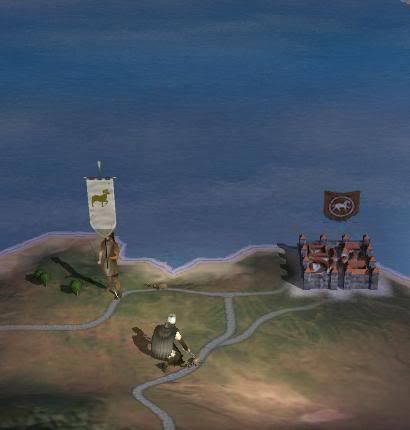

Couriers arrived from Harumetum and told of the town now under Rome once more and of a population eager to belong to the Respublica again. Nero Vettus, the Pius, sat in the governor’s curial seat and saw to the re-ordering of the town’s defences and supplies while his father, Promotus, and his remaining three brothers, Zeno, Ustus and Majorianus, attended to the levied recruits and securing the outlying settlements.


Bonifacius, ever watchful on the walls, eased a little at this news. He knew that Heraclianus, the Comes of Africa and the Imperial estates, still did not like it. The others, Silvanus, Felix and Monaxius remained neutral. Only Antiochus, ‘the Greek’, supported the gain of Harumetum and now seemed vindicated. His argument that Rome had always existed through the fascis and that power endured in union was one that could not easily be overturned. But still Bonifacius sensed that their meagre forces were now too stretched in this tiny province of Africa.
It was then, on the Ides of the new month, that old Heraclianus, scowling as ever, was seized with a fit while reprimanding a recruit on parade and passed away. It was a blow they could ill-afford. His wisdom and advice had been vital to their plans and now his loss was sorely felt. It was a grim omen and was one compounded with the news from Lentulus Octavianus that a Vandal host was now marching westwards down the Via Claudiani for Carthage it seemed.


Alone, at night upon the wall which faced north across the sea towards unseen Italy and Rome, Bonifacius gripped the cold marble and felt his mind tumble into despair. Too soon. It was all too soon. The Romans were not ready yet. Not ready by far. His knuckles went white against the marble.

Last edited by SeniorBatavianHorse; September 05, 2007 at 12:27 PM.
Reason: grammar - and because I can!
-
September 06, 2007, 11:25 AM
#9
 Re: The Last of the Romans - AAR
Re: The Last of the Romans - AAR
A Storm From the East
The lone galley had limped into Carthage some days after the funeral ceremonies for Heraclianus, during which orations had been given by the prominent members of the city council, and a local synod of bishops and deacons had also blessed his remains with all due ceremony. The galley had been spotted by shipwrights still outfitting the ‘Africanus’, a trireme now almost built and ready for sail. High up on the main mast, they had spotted the large, single, sail of another galley and watched with wonder as it had emerged from the blue haze of a low mist and manoeuvred slowly into the vast dock areas of the city. The galley was a trireme also but clearly a survivor unlike the gleaming paint-work of the ‘Africanus’. Her sides were scorched with burn marks and great rents hung in her canvas like wounds. The men onboard, brown-skinned Greeks and Aegyptians, were all worn and lethargic. Under shouts from the men on the ‘Africanus’, this new galley rowed up alongside and lashed herself against her new twin.
Bonifacius had had barely time to throw off his civic robes and don something more austere - the military cloak and the wide cingulum belt of an officer - and stride down the boarding plank of this new galley. In his mind, thoughts swirled in confusion. Was this an advance element of a New Roman fleet, he wondered? Had it fought its way through the Vandal galleys like a lion shaking off jackals? Perhaps Constantinople was readying itself to reclaim Rome from the barbarian invaders at last?
Once onboard, he realised that it was not so. The sailors looked at him with misery in their eyes and a dullness which told him without having to ask that this galley was no advance scout but a battered survivor, cowed in defeat. There, slumped against the main rear cabin, was a Roman of Senatorial rank, and he too was beaten and exhausted. Bonifacius gestured to his slaves and they raised him gently up and took him away to be cleaned and fed.

And so the ‘Alexander’ arrived in Carthage, bearing Romulus Ventidius, a survivor from Italy, a youth of sixteen, the last of his ancient gens. And to the city of Africa he brought not just a Roman warship and its crew of marines and sailors, but also fighting men who had helped evacuate him from the barbarian hordes, and - to the amazement of the Dux and the other remaining Senators in Carthage - the gold reserves of Brundisium and Regium - lifted from under the noses of the barbarians even as they had been despoiling the towns in fury.
The next day this Romulus Ventidius was admitted to the Senate-in-Exile and joined the illustrious ranks of those few pledged to restore Rome to her former Imperial glory. To Bonifacius, overseeing the oaths and the venerable ceremonies, both christian and pagan, something almost absurd struck him as he watched the thin youth of sixteen drink the libations and kiss the purple of the Imperial Regalia as the priests chanted out the solemn ‘te deum’ in the background. Had Rome come to this, he wondered?
There was no time for celebrations however as word from Lentulus arrived that the Vandal raiding force closing in on Carthage had vanished into the mountainous region to the south and east. A small reprieve but it forced the Dux to send riders to Harumetum to warn Probus Vettus in case the barbarians were skirting the larger city to close in on the smaller.
Days passed with no word from Lentulus in the west and then, finally, the ‘Africanus’ was ready. With the ‘Alexander’ in tow, the two warships put out into the harbour under the command of Justinianus, newly promoted Praepositus of the Carthage Classis. Another young Roman whose only qualification was his experience as the second-in-command of the ‘Alexander’. The two galleys spent the afternoon practising manoeuvres under the gaze of the city crowds eager to watch the show and for awhile something akin to martial glory was fired in their hearts.

The next day all dreams of Rome rising from the African sands fell apart like straw.

Lentulus Octavianus had been wrong. The Vandal army marching towards Carthage and which had vanished south into the interior mountains had been a diversion. Bonifacius should have sensed it - their forces had been too open and easy to follow until their disappearance. No, that host had been sent out precisely to distract them. For now, out of the shores to the west of Carthage, on the beaches and small spits guarded with rocks, stood a Vandal fleet aground and disembarking hosts of spearmen, archers, armoured foot and Alani cavalry with their mounts. The dawn had brought them moving confidently into the shallows, each galley and cargo-ship moving expertly on the tides, until they had beached and begun unloading their troops. Thousands of barbarians poured ashore a little over a mile from the marbled walls of Carthage and moved quickly to seize the roads out of the city.

In alarm, the Dux and the other Senators sent out word to the Vettii and then ordered all the gates to be secured. Before the two galleys could be sent away from Carthage to be saved, Vandal ships appeared and blockaded the harbour and docks, hurling taunts out to the crews of the ‘Africanus’ and the ‘Alexander’, daring them to row out and challenge them to fight. Julianus, gazing with uncertainty at the Dux, ordered both triremes to pull back into their berths.

Then the siege began in earnest as the Vandals threw up earthworks around the high walls and began construction on siege towers and rams, demolishing the small huts and settlements which existed beyond the walls along the wide Roman roads. Watch-fires sprang up in the night and girdled the city like a blazing necklace.
Bonifacius, Antiochus, Monaxius, Silvanus, Felix and now young shivering Romulus stood upon the walls and watched the barbarian net close in around them, knowing in all their hearts that time alone was going to defeat them and turn this once-proud city into ash and rubble.
-
September 06, 2007, 12:28 PM
#10
 Re: The Last of the Romans - AAR
Re: The Last of the Romans - AAR
I really have a bad feeling about this. I'm going to hope for a miracle.
-
September 06, 2007, 12:34 PM
#11
 Re: The Last of the Romans - AAR
Re: The Last of the Romans - AAR
You're not the only one . . .
-
September 06, 2007, 12:56 PM
#12
 Re: The Last of the Romans - AAR
Re: The Last of the Romans - AAR
<puts a few stray gold pieces and arrows and shields in a cardboard box addressed to "Carthage">
-
September 06, 2007, 12:58 PM
#13
 Re: The Last of the Romans - AAR
Re: The Last of the Romans - AAR
Gee! I don't know if I'm enjoying more this great story or the book you recommended me  . Let the Christian God save the imperium!
. Let the Christian God save the imperium!
-
September 07, 2007, 03:58 PM
#14
 Re: The Last of the Romans - AAR
Re: The Last of the Romans - AAR
Dust and Hope
The siege began in earnest the next day as Vandal archers moved up and peppered the walls, striving to repulse the Roman sagitarii from their positions. To their credit, the newly recruited men held their nerve and loosened off shot after shot in return. By mid-day, with bodies littering the dried-up grass around the walls, the barbarians retired in some disarray. The men of the walls cheered and looked up to Bonifacius and the Senators on the high tower over the main gate with fierce eyes.
The Dux ordered water brought up the walls and then turned to his honoured companions of Illustrious rank. As the sun beat down, these Romans studied the ground about them and the Vandal dispositions, scratching notes in their wax tablets, and sending their slaves to bring up various scrolls and codicils from the officium. After much consultation and heated debate, Antiochus, ‘the Greek’, voiced his concern first. He pointed out that they were too few to defend all the walls of this large city - and that those they did have were mostly heavy horse clearly unsuited to holding bastions against siege towers and ladders and what not. The others agreed, gazing out at the Vandal hosts across the plains. Bonifacius listed the troops under their control - the beginnings of the newly enrolled I Africanus Legio, which consisted of a single ordo of ballista, an ordo of light skirmishers, an ordo of light infantry and an ordo of archers - all commanded by the Tribune Maxentius.

At best, these raw recruits could perhaps hold one of the gates into the city. No more. Then there were the various cavalry ordines - forming the Equites Heracliani Vexillatio, a mixture of various heavy cavalry named after Heraclianus in honour of his death. Eight ordines of cavalry commanded by the Tribune Scholarion. The rest were armed colonii and townsfolk who all here on the walls knew would break and run at the first sign of the barbarians.


Bonifacius gazed out in despair. Dust rose up in the distance, over the low hill, studded with apple orchards and vine bushes. The Vandal forces rippled with purpose and determination as they spread out around the perimeter of the long walls, to erect vallums and palisades of shields. Sunlight flashed from spear-tip and sword. Tents were being erected behind the lines - and in the far distance he could see the Vandal galleys and ships slipping back out into the waters to tighten the blockade on the city. The dust rose ever higher behind the Vandals - and then in his eyes something gleamed or sparkled far out among the orchards in that dust. Then he saw the Vandal lines shiver slightly as though caught in a breeze. Antiochus, next to him, by the parapet, swore in surprise.
The dust rose even higher and now cries drifted across the plain of burnt grass. Vandal standards dipped in confusion and now all could see that Roman cavalry were riding as if all the demons of hell were on their heels, straight through the barbarians and towards Carthage itself. A small compact force in tight formation, shields locked and kontos lances levelled.


Bonifacius spun around and shouted for the gates to be opened. In alarm, the men below sprang up and dragged the iron bolts aside. The archers of the Fourth Ordo, I Africanus Legio, leaned out over the marble walls and shouted out to their unknown comrades in the distance urging them on.

The Roman cavalry, barely seventy troopers all told, were now in the thick of the confused Vandals - who obviously had not expected an attack from their rear. To the sound of the massive gates being drawn open, Bonifacius gripped the walls with his hand as, against all the odds, the Romans gave a final charge and then broke through the lines of the barbarians to make for the safety of the open gates. Bodies lay littered in their wake.





Behind them, the barbarian chieftains sought to rally their disorganised men and pull them back from pursuit lest a trap was sprung - and then the Romans, in dust-caked armour and trappings, were under the parapets and the gates and into the city. Shouts and cheers surrounded them as they cantered slowly through the crowds now surging out to meet them.






Moments later, the commanding officer mounted the steps to the tower above the gates and introduced himself to the Senators.
His name was Luca Popillius, son of the Comes Tingitaniae, from the east, now rotting with his troops in the sands of the desert. He had escaped from the last disastrous battle at the behest of his dying father, with the remaining cavalry, the Candidatii, and evaded the Vandals by heading deeper into the deserts to the south. There, they had taken shelter amongst the pagan barbarian nomads, fearful lest they would be betrayed - but it turned out that these nomads hated the Vandals more than the Romans. Then word had arrived that the Roman Senate was in Carthage and that an Augustus was to be crowned again. So he had decided to ride out of the deserts and come to Carthage.


Bonifacius and the others gaped in surprise at this new young Senator and his brash courage - and they all crowded him with congratulations - marvelling as he looked awkward by their attentions. But it was then that Bonifacius stood apart and gazed down upon the settling lines of the Vandal besiegers, frowning a little in thought. Silvanus, the commissariat officer of the city and what little army they had, approached him in query, placing a hand upon his shoulder. Bonifacius laughed then and looked to Luca still coated in the dust of battle. And a mighty plan formed in his mind.
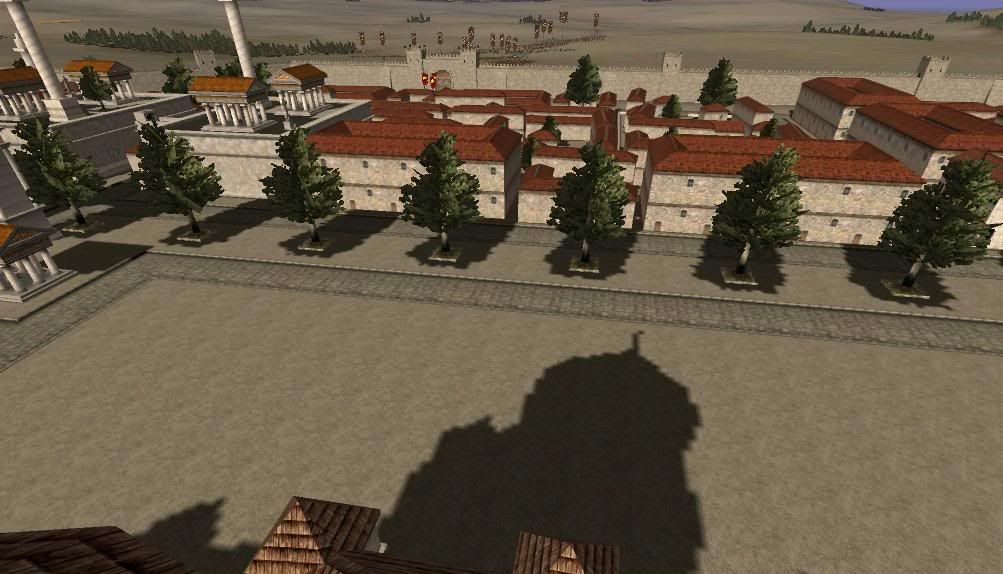
-
September 08, 2007, 08:22 AM
#15
 Re: The Last of the Romans - AAR
Re: The Last of the Romans - AAR
The Day of Blood and Lamentation.
They had argued all through the night by the flickering light of the oil lamps. Slaves had waited tensely in the corners of the large hall, amid the columns, as voices raged and hands had been thrown up in despair. Wine flowed freely and always the firm voice of Bonifacius rode over all, despite the objections of age and experience. Then as the dawn light slowly filtered down through the high windows, silence at last reigned and each man there, a Senator of Rome now in exile, from the older soldiers and statesmen to the newer and younger arrivals, Luca and Romulus, at last nodded agreement and made peace with his soul and his god, as the Dux won all over to his strategy. He was helped by the arrival of a sentry from the walls with a message wrapped up around an arrow which had been fired over the parapets. The news within excited all who heard Bonifacius read it out - Promotus Vettus with his sons and the infantry were hiding some miles to the west behind the Vandal lines, having vacated Harumetum to come their aid. They alone were not enough to tip the balance but would be able to perhaps harry the barbarians’ supply lines if needed.

Dawn brought an new urgency and men were dispatched to order the cavalry and the infantry for the day. As the Senators emerged from the cavernous interior out into the daylight, they found assembled all the soldiers of the city upon the old forum, in rank after rank, gleaming in their untried arms. Around them stood the mass of the citizenry in cowls and shawls, holding babes and children by the hand. Bonifacius mounted a hasty dais and spoke with the Senators ranged around him. He began by reminding them of Fortune’s blessing with the arrival of Romulus and the ‘Alexander’ from the sea and then Luca and his cavalry from the land, surely a lucky and propitious omen. Then he extolled the city of Carthage and its ancient history from enemy of Rome to her staunchest ally and now her saviour. The people of Africa were noble and carried a blood going as far back as history itself. Then he poured scorn upon these Vandal barbarians riding with arrogance over the African lands in fire and rapine. Who were these impudent children, he asked in scorn, that Rome herself cowered at their coming? Not on this day, he vowed. Rome would not cower on this day even as they taunted their marble walls and high towers. Yes, the Eternal City lay ravished in the hands of barbarians. Yes, the Respublica was in tatters and lay low in the dust of defeat. And yes the once mighty legions of Rome were broken and scattered across Europa and Africa. But today brought an end to all that, he swore. Bonifacius held up the old symbol of Roman might, the tied bundle of birch rods wound in a scarlet ribbon, and took an axe from one of the guards. This he placed deep into the bundle and retied it. Rome: Reborn, he cried out, and held it high above all their heads.
Then began the preparations for the coming battle.
The plan was simple enough but depended upon timing and co-ordination. Luca had provided the inspiration and Bonifacius had not been slow to grill the new Senator on his ride through the Vandal lines with his cavalry. Despite himself, Bonifacius liked the young commander, and marvelled at his tale of flight and exile after the death of his father. There was something about him that reminded Bonifacius of his own youth: a certain courage welded to simplicity and honesty. Yet in Luca such feelings were marred also with pain and vengeance. No man should watch the death of his father and have to ride away from that carnage intact. The Dux sensed that in young Luca there burned a bitterness which had yet to be exorcised. Against his will, he found himself comparing Luca to their other arrival, Romulus, who was still thin and painfully weak. His own exile had been no harder than Luca’s and yet the two men had born it quite differently. Well, Bonifacius mused, today would change all that, one way or another.

By midday, the ordines of infantry and cavalry were assembling in their positions around the city and the Senators, garbed now in the armour of Rome, rode out to take command of their troops. Bonifacius took with him Felix, Antiochus, and Monaxius. Silvanus took Romulus and Luca, together with the Tribune Scholarion. The soldiers of the I Africanus Legio under Maxentius assembled separately behind the massive oak gates which faced west along the Via Claudiani and to the Vandal hosts.


The plan was simple and yet rested upon one single moment of timing which if judged wrongly would doom them all.
The sun reached its zenith and then Bonifacius nodded to the bucinator and the signal was given. To the north and south of the city, the massive gates creaked open and then the cavalry of Rome poured forth in long columns, out of Carthage, standards high into the wind so that the dragons roared.





Assembling as quickly as they could into ordered lines, the ordines then advanced westwards along the circuit of the huge walls as, far in the distance, the Vandal lines seethed in confusion at the unexpected emergence of the Romans from the safety of their walls. Clouds of dust rose into the air as the barbarian chieftains whipped their men into some semblance of order as the cavalry from left and right closed in on them without mercy.



Silvanus led the left wing ordines, with Romulus and Luca in tow, hedged in by Maxentius. Four ordines of heavy Roman cavalry in regular formation, and on powerful Hunnic mounts, the best in the western world. The ground thundered beneath their hooves and the wind tore at their bodies as the horses picked up pace. Dressing the men, the line officers, Ducenarii and Centenarii, shouted out rough commands in the old military Latin of the Imperium. The formation rounded the north-west corner of the walls and before them lay the mass of Vandals, roiling with confusion. Silvanus laughed then and glanced into the faces of the two Senators nearby - Luca smiling in calm joy and Romulus with sweat beading his face. All around the commissariat officer men looked with eagerness at the closing lines of the barbarians and he realised that in their hearts lay vengeance for the defeat of Rome and all her empire. Now it was time to glut their weapons on Vandal blood. He ordered the charge to be sounded and tightened the grip on his kontos.
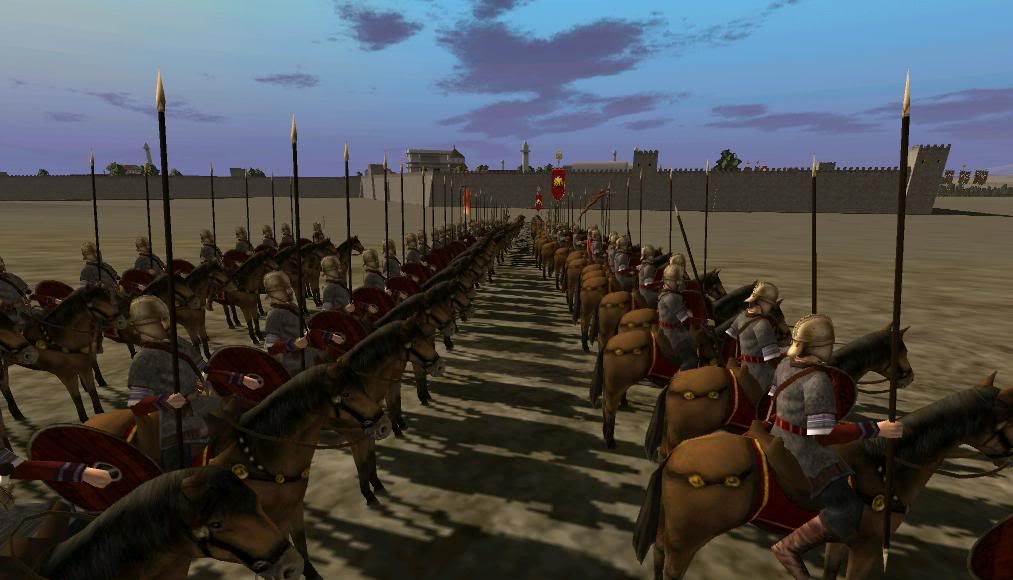

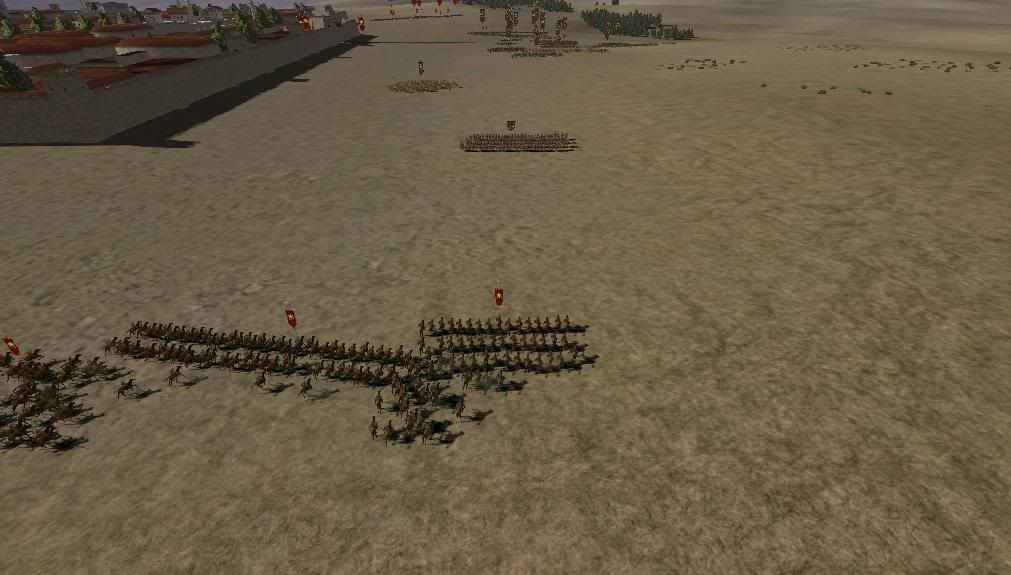
On the south circuit, Bonifacius also dressed the ranks and moved the cavalry ordines forward to engage the enemy. Far ahead, he could see that the Vandals were uncertain how to deal with a double flanking assault in force. The spearmen were running back to their standards away from the picket lines and grabbing up their large shields. Alani skirmish cavalry were mounting up and riding northwards towards the emerging cavalry of Silvanus while here, towards the south, infantry and archers were quickly moving up. So far so good, he thought. The plan was proceeding as he hoped it would. Glancing up at the walls as he rode past, the Dux caught sight of the runner moving along the battlements, pacing his horse. Upon that man, he thought, all hopes rested.
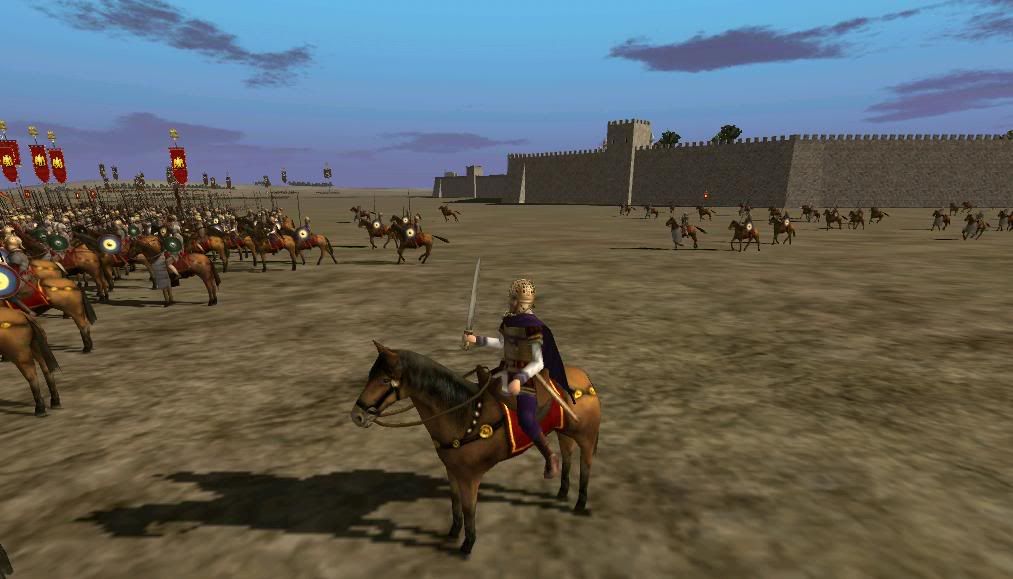
The Romans of Silvanus crashed like a tidal wave into the Alans who had moved up to check their advance. Here on the left flank the fighting was bloody and savage as the horses crashed into each other and men wielded lance against lance with deadly effect. Dust rose up into the air, pierced now with cries of men and animals, and all became a confusion; a tapestry of war in which the wine-dark threads are ever spun and know no end. Silvanus, lost in the confusion of the fighting, missing suddenly his ledgers and scrolls, had time briefly to glance up at the high walls and wonder on the fate of them all.
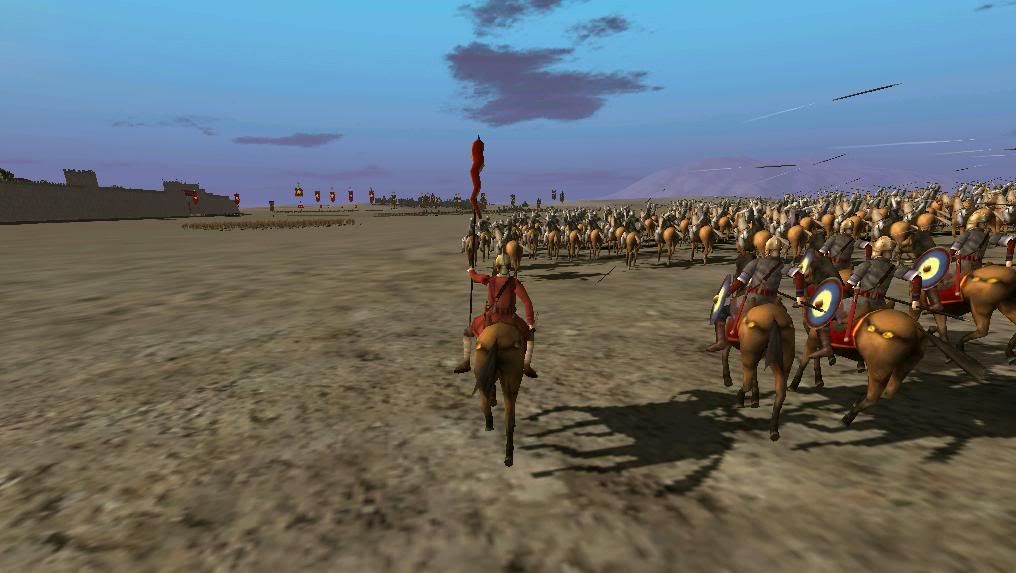


The fighting was equally brutal now on the right flank where Bonifacius’ men had become entangled with the Vandal spearmen and infantry. He had brushed aside the levied troops of the barbarians as easily as a hand sweeps through sand, and now they were all caught up in the confused lines of the Vandal spearmen who were attempting to form a shield-wall and push his troopers back out into the exposed plain.
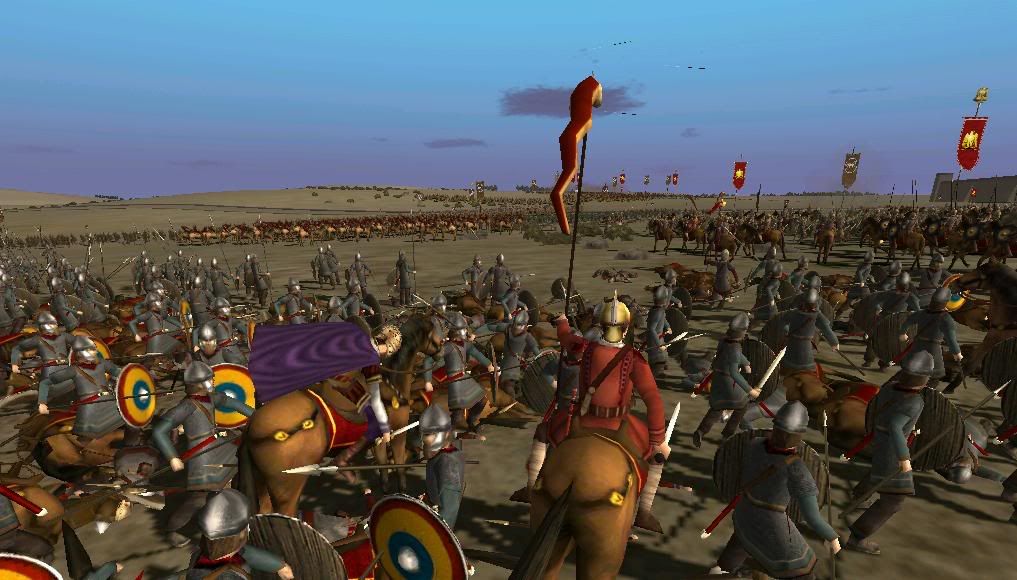
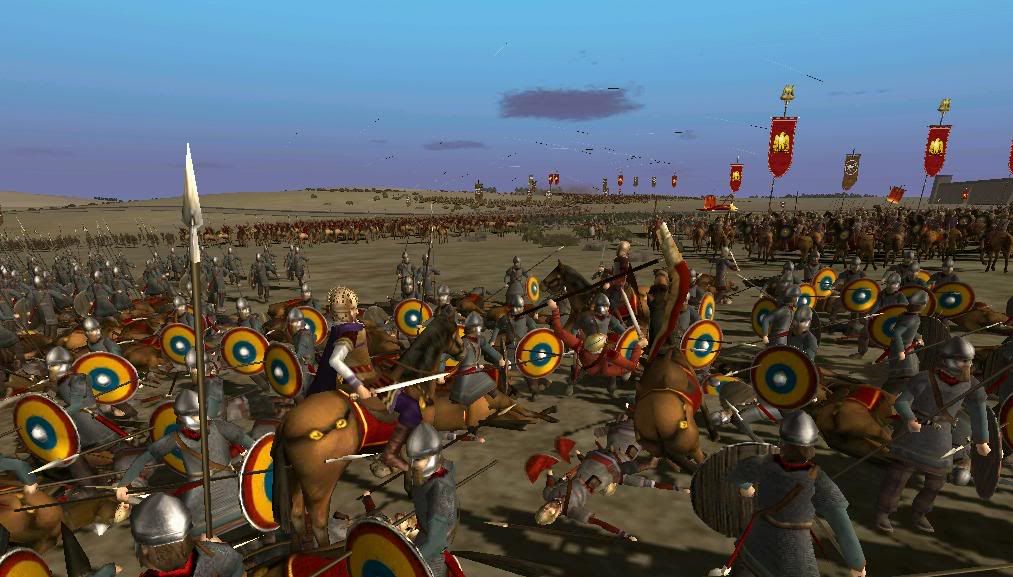
Far away, he could see the right flank cavalry pushing ever closer towards the single long line of the Via Claudiani as it drove westwards, almost creating a division between the Vandals, who were moving left and right to counter the Roman flanking forces. Even as he watched, the barbarians separated in the centre and moved apart to counter the cavalry attacks. He felt like Moses watching the Red Sea part and knew then the triumph of the Jews in their own exile from Aegypt. He turned to the distant runner on the walls and raised his hand in an unmistakable gesture. The distant man vanished in an instant.
The old high gates of the West Wall groaned and slowly parted. The clank of iron bolts resounded like a death knell and then pouring out like a river of doom came the eager men of the I Africanus Legio. Cornus sounded and roaring the old ‘barritus’ war-cry, these men, newly formed and untried in war, advanced in force straight into the widening gap of the barbarians, down the old Roman road which stretched from Alexandria to the edge of the very world. Bonifacius grinned fiercely then at the sight of the legionaries advancing out of Carthage. To the heartbeat itself, he thought, and vowed to thank personally the runner on the wall.


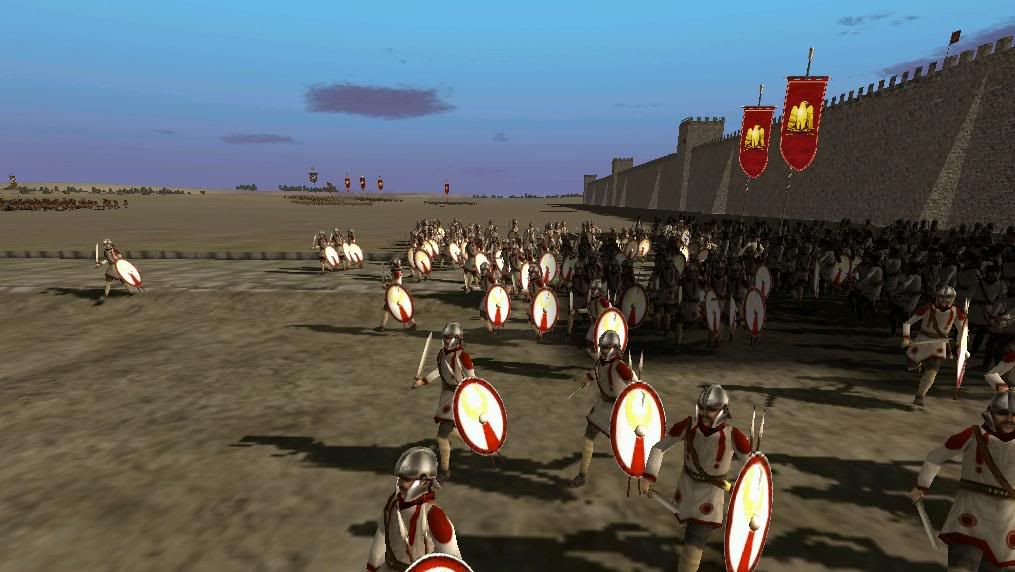
Silvanus fell first into the press of the fighting. Hacked down by Alans and cut off from his guards. His death was the signal for the Romans to glut their swords ever more fiercely and make the Alani pay their impudence. The fighting grew ever more desperate as the regular cavalry closed up shields and raised their lances for another charge into the milling confusion of the barbarians. Bucinas sounded once more and, led by a wild cry from Luca, the Romans plunged again into the battle.
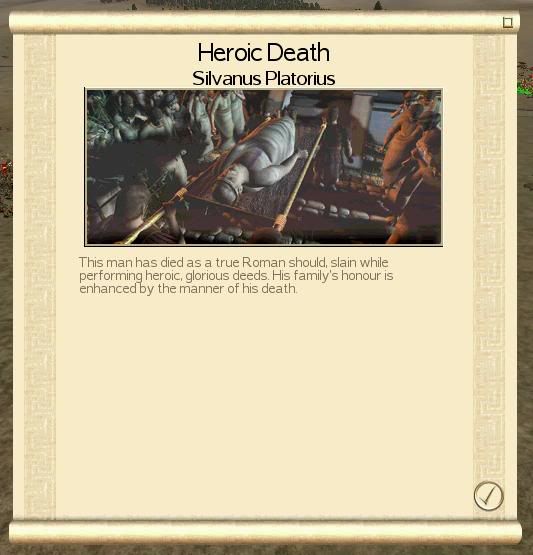

Antiochus, ‘the Greek’, fell next on the left wing with Bonifacius, trapped beneath his wounded horse and run through by a spearmen while helpless. The barbarian was seen to hack his head off in triumph and wave it up high to bolster the morale of his comrades. That act brought a trio of Roman cavalrymen down upon him in cold vengeance so that that was the last thing he did.
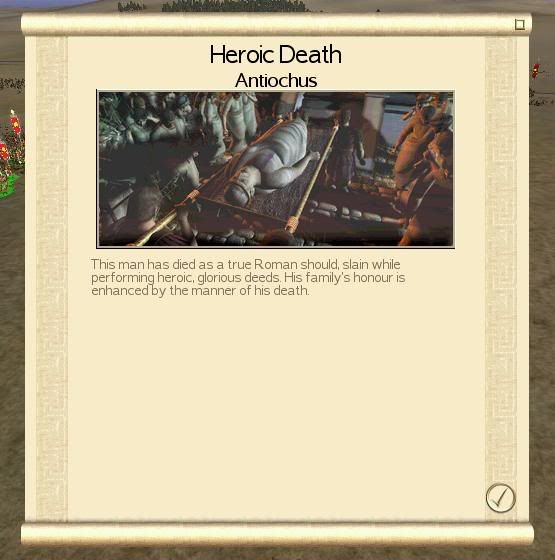
His friend, Monaxius Coruncanius, fell soon afterward in the bitter fighting. A stray javelin catching him in the neck below the cheek-guard of his helmet. Despite his guards catching at the bridle of his horse to lead him out to safety, the Roman Senator was dead in moments, bleeding heavily from the wound.
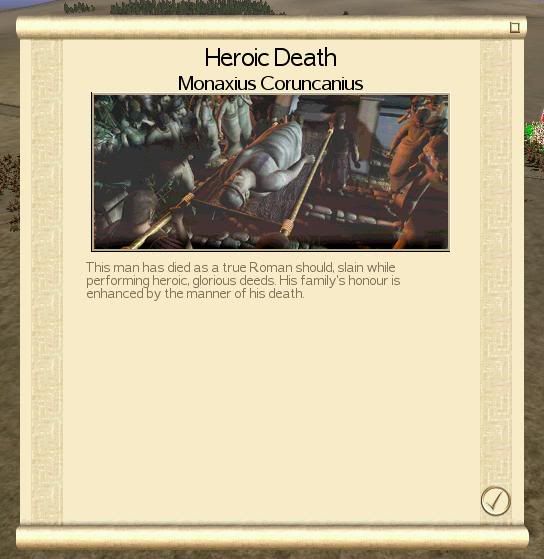
Bonifacius scarcely noticed their deaths - there was no time for mourning as the cavalry pushed the Vandals back onto each other even as the men of the I Africanus Legio advanced forwards and closed down the trap - what would afterwards become known as the ‘Jaws of Bonifacius’. Barbarians were scattering all around them. Throwing away spears and shields and running westwards down the road. It was then as the fighting reached its most vicious that the Vandal chieftain fell to the spatha of the Senator, Felix, deep in the ranks of the barbarians.
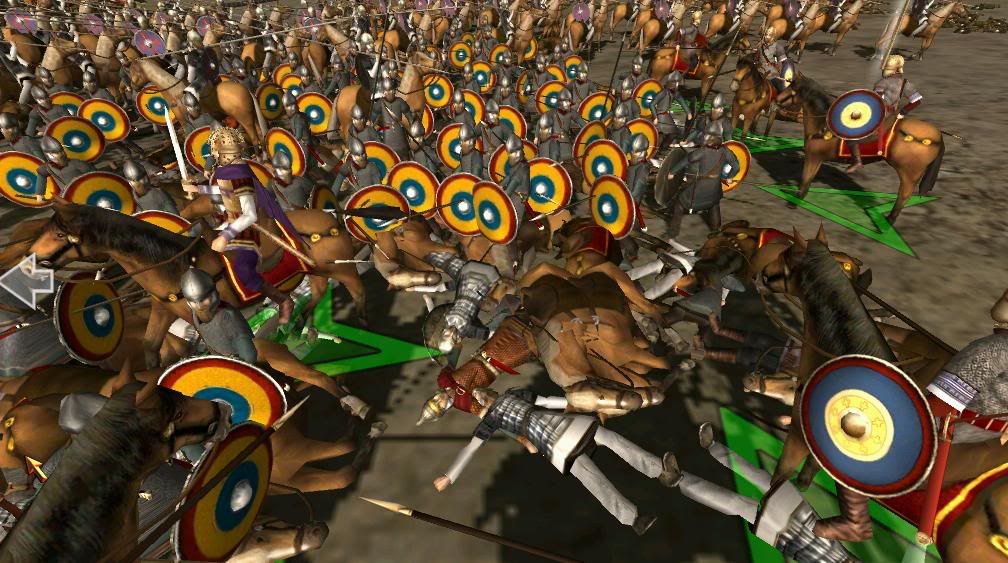
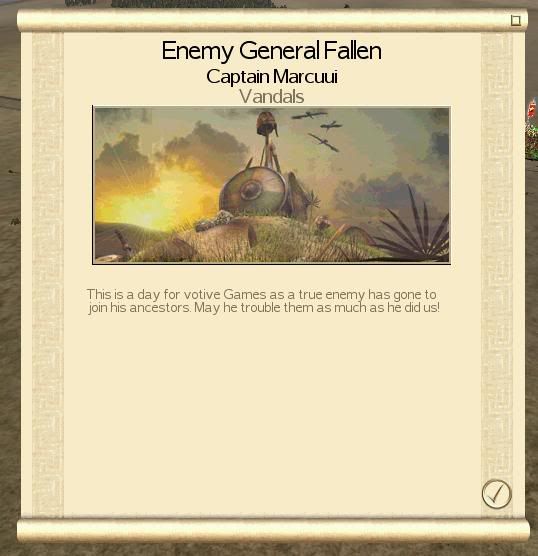
With his death, the Vandals collapsed and routed. What was a battle now became a slaughter as the legionaries cut through the remaining barbarians and showed them no mercy. Even the ballista crews had managed to drag their machines out of the gate to fire upon the retreating men.
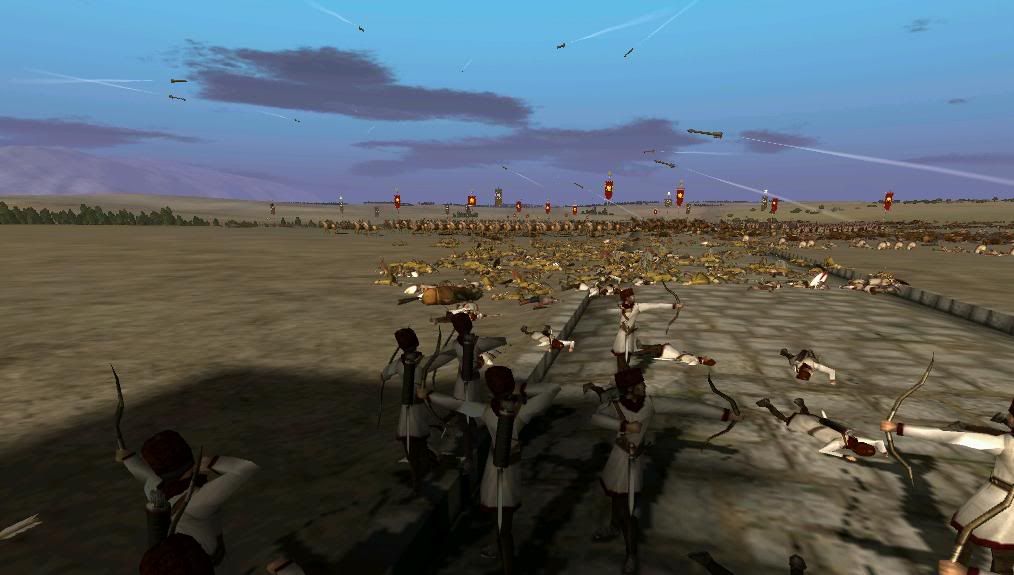
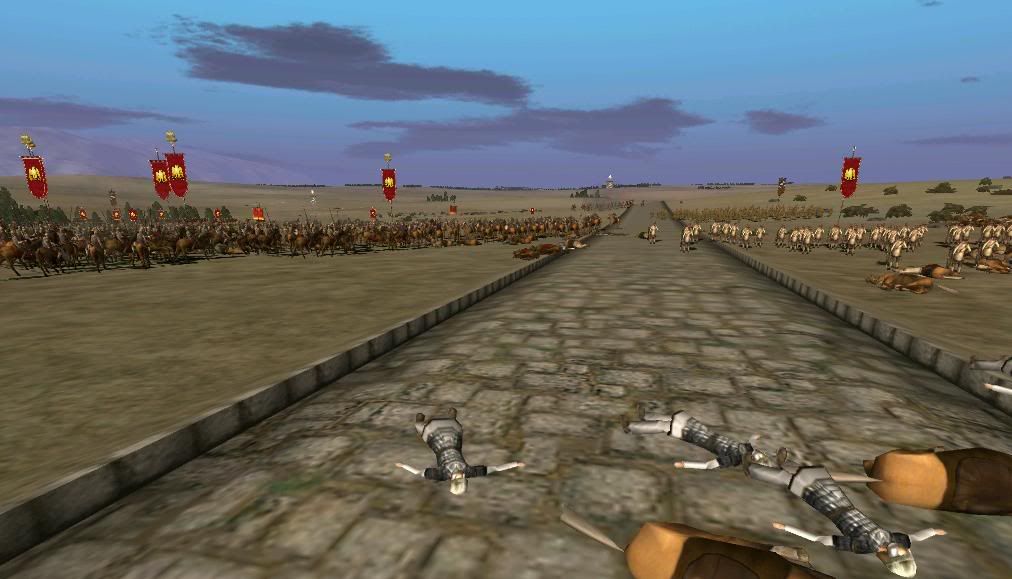
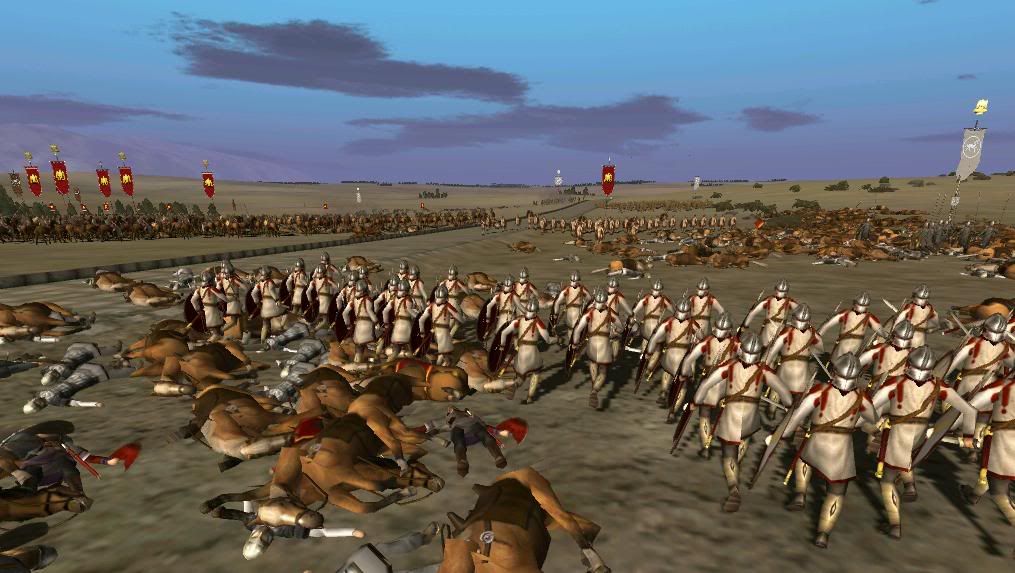
The last Vandal spearmen were caught and slaughtered without mercy as they tried to retire in good order from the field of battle.
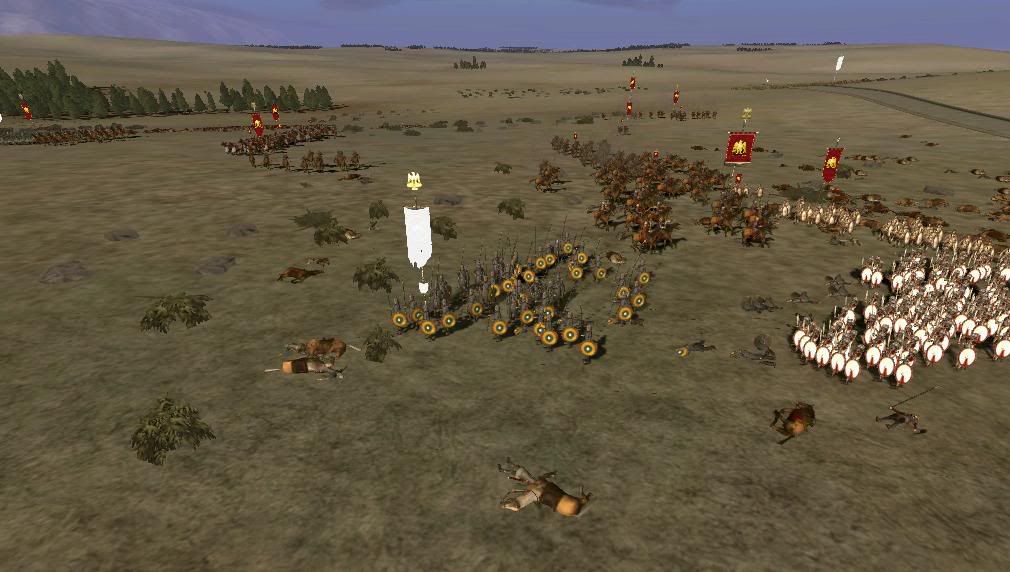
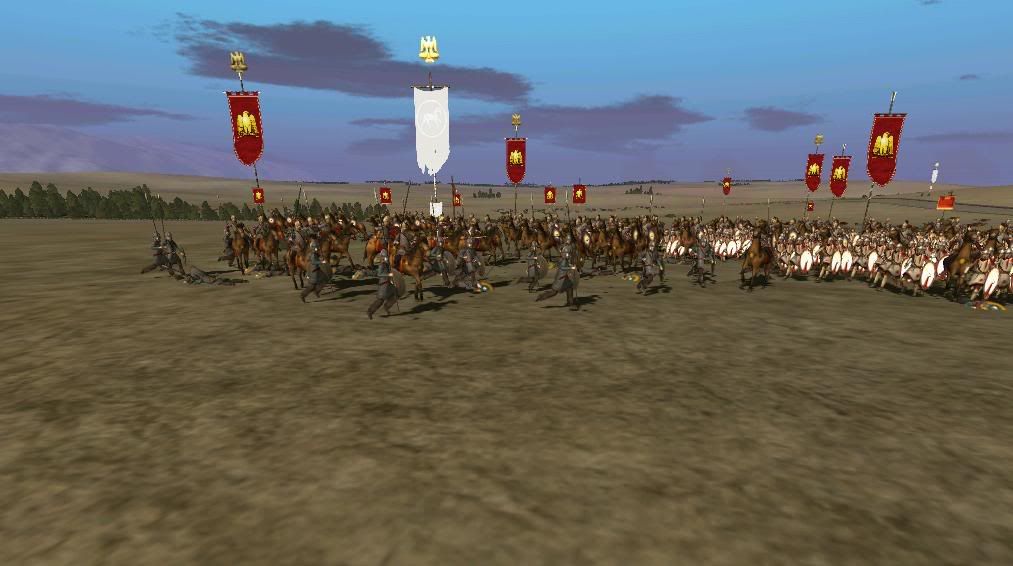
The Romans were victors on the field of battle in the shadow of Carthage and its marble walls.
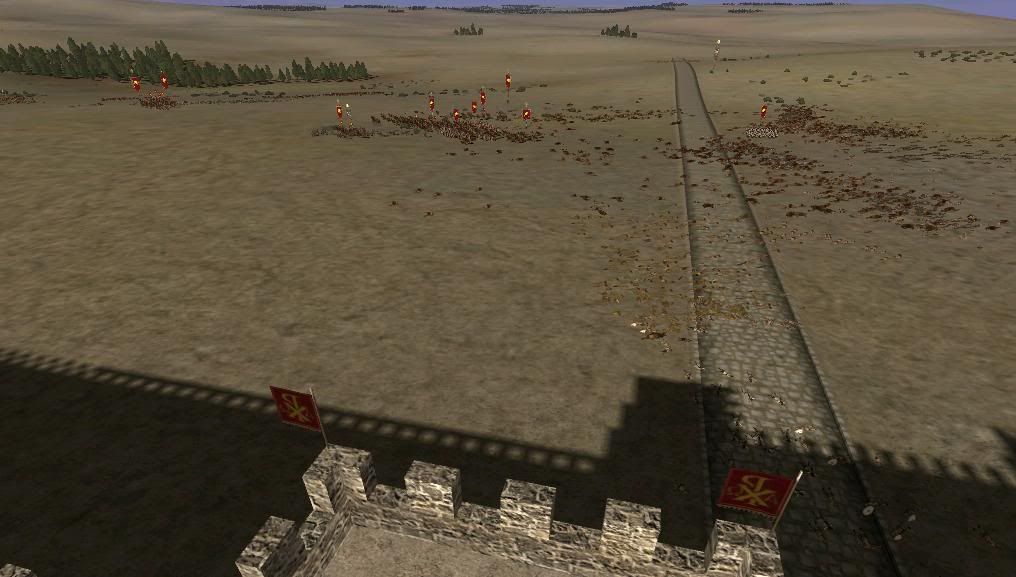
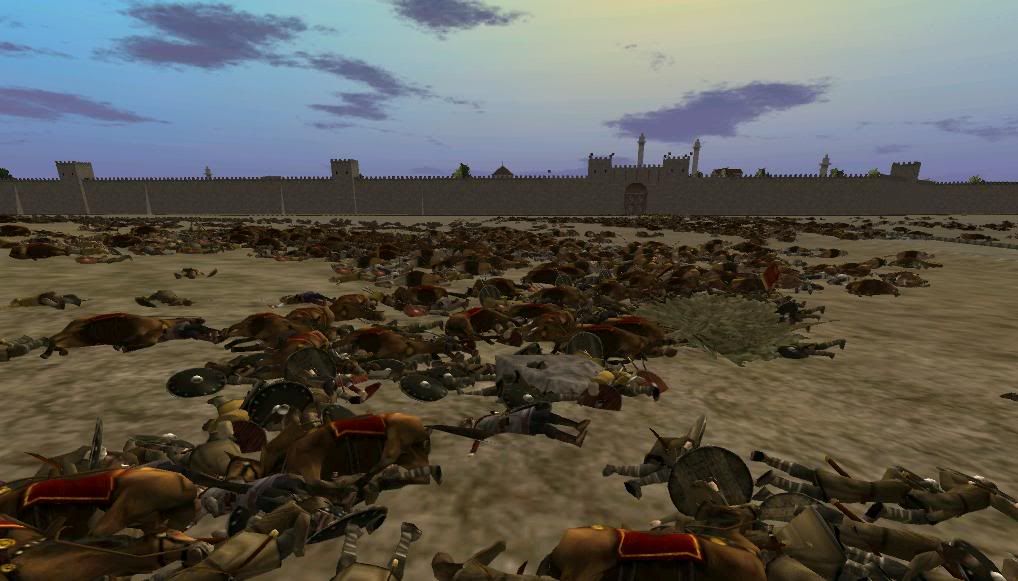
A single troop of Alan horsemen routed too close to the walls and attempted to return back through the Roman lines. It was then that Luca, alone of his Candidatii, who were either dead or wounded, while resting amid the lines of Silvanus’ men, saw them and put aside his calm exterior and simple logic. Before Bonifacius could stop him, the young Senator, alone surviving of his family, spurred his horse forward and rode into the oncoming Alans. Stunned by his actions, all the Romans could watch in disbelief as he cut first one down then another and then another so that they turned in fear and tried to ride away from this avenging demon. But Luca pursued them, killing one after the other, until seized with panic the remaining Alans turned again towards the Roman lines not knowing what they were doing. Again his sword flashed crimson with vengeance and again the Alans fell. Finally, the remaining barbarian horseman, his face contorted in fear, fell to the arrows of the sagitarii, who felt pity for his plight. Luca reined in then and remained motionless upon his horse, alone with his dark thoughts.
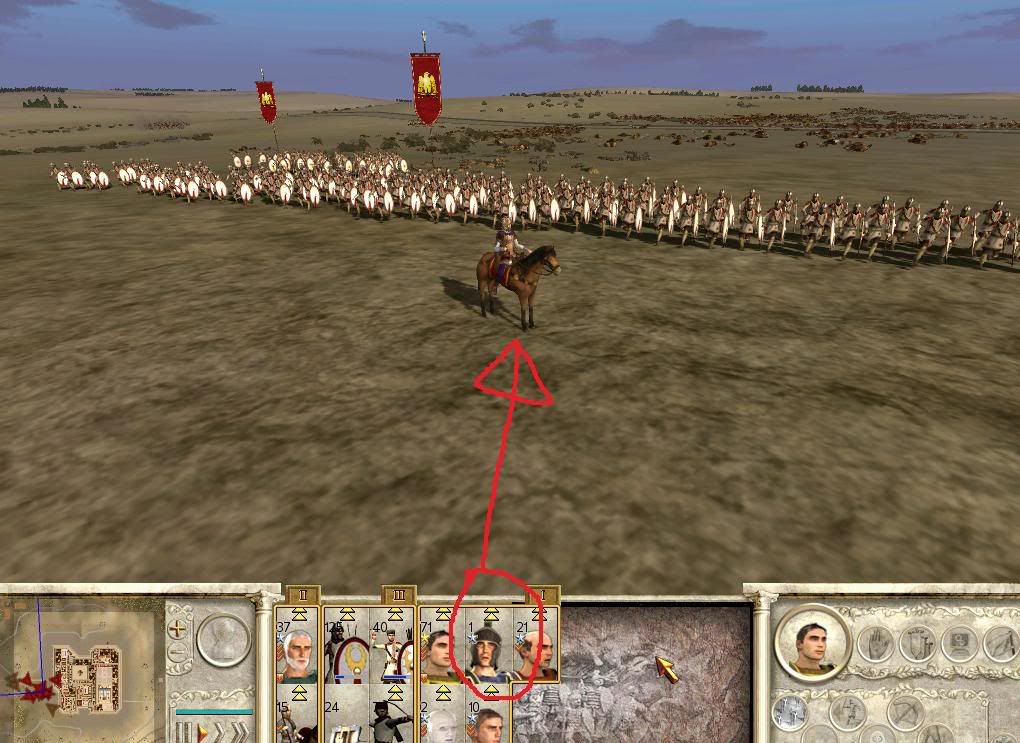
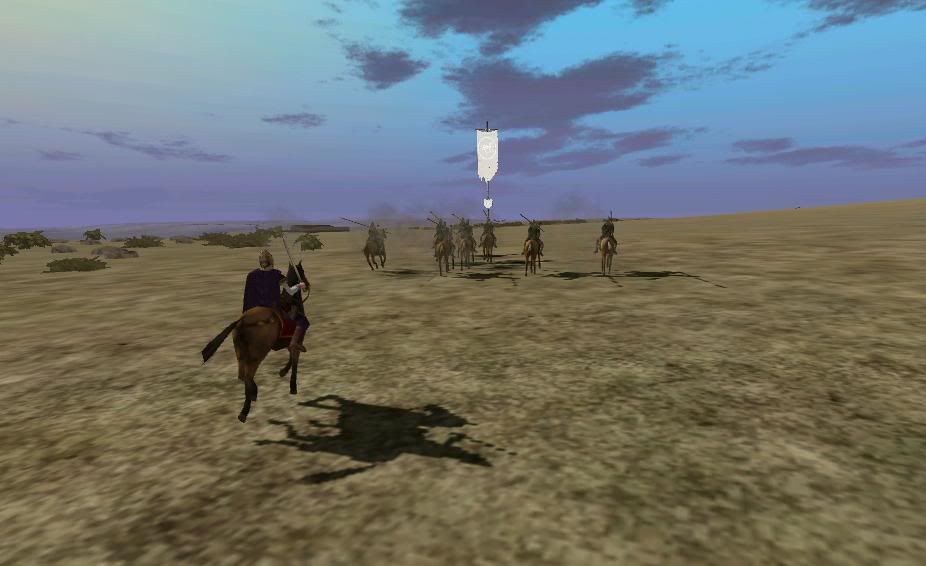
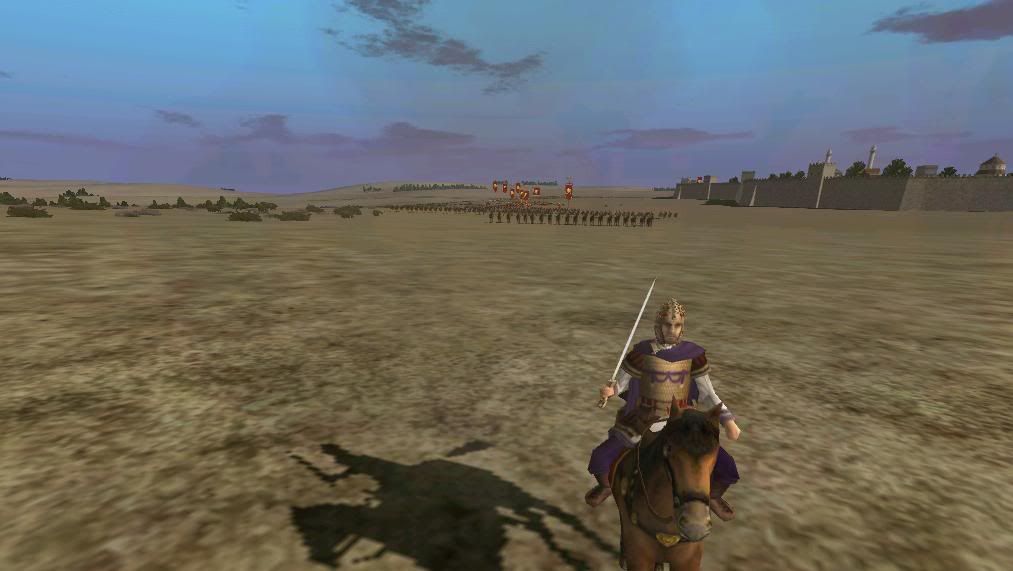
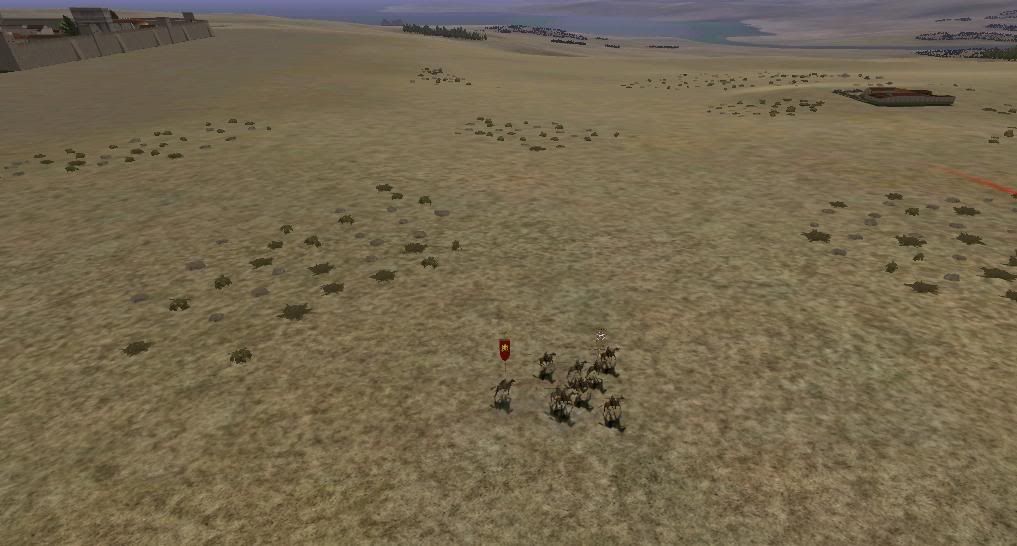
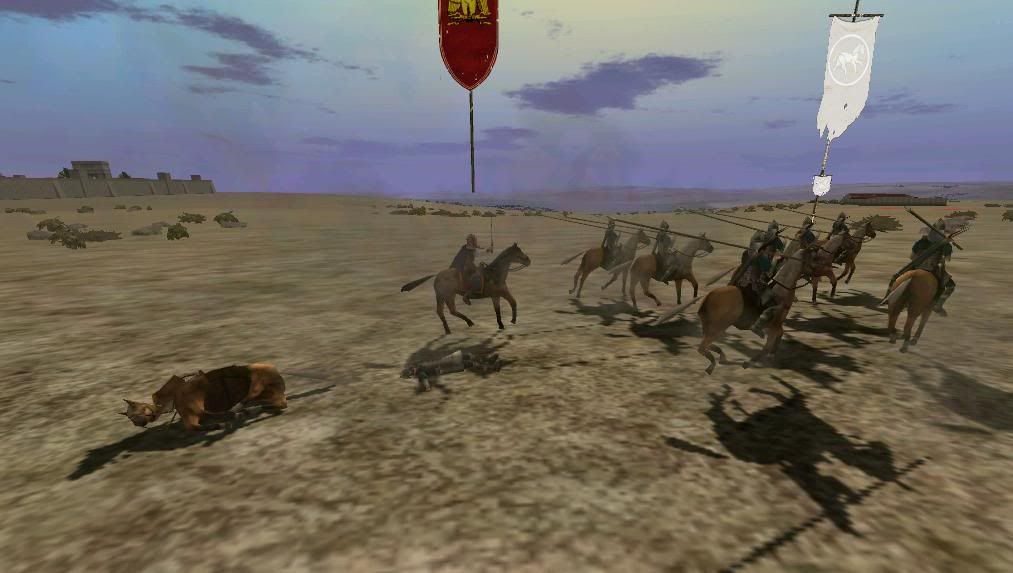
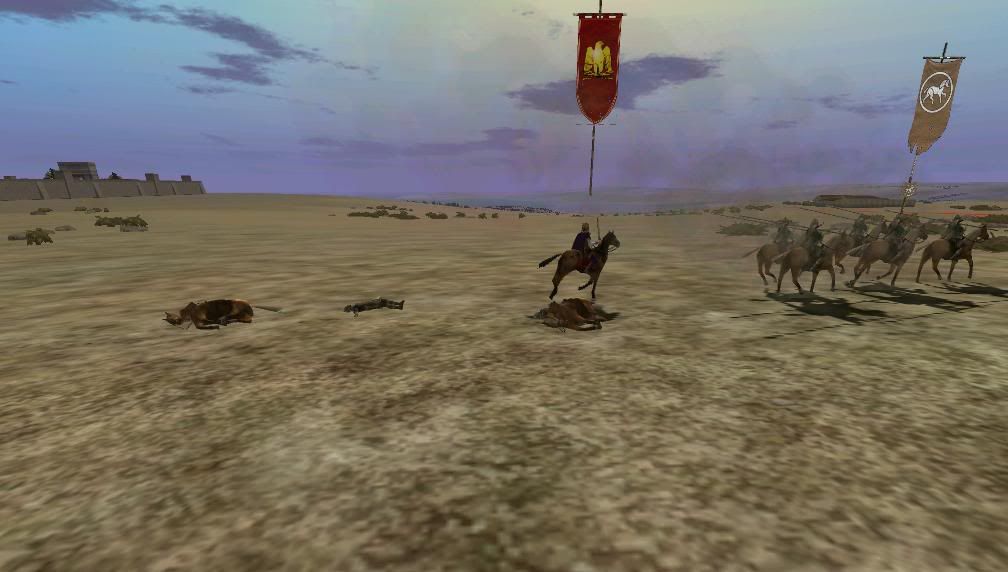









This new Rome had won its first battle on the plains before Carthage but it was a victory which had seen three of the original Eleven cut down. Other losses were high, especially from the various ranks of the cavalry who had fought so hard to allow the trap to be sprung.


-
September 08, 2007, 08:56 AM
#16
 Re: The Last of the Romans - AAR
Re: The Last of the Romans - AAR
great read,
well thought out!!
excellent
-
September 08, 2007, 10:42 AM
#17
 Re: The Last of the Romans - AAR
Re: The Last of the Romans - AAR
Nicely played! Very nice.
Having so many generals makes some very interesting tactics possible. 
-
September 08, 2007, 11:41 AM
#18
 Re: The Last of the Romans - AAR
Re: The Last of the Romans - AAR
This is a great read once again.
-
September 08, 2007, 12:29 PM
#19
 Re: The Last of the Romans - AAR
Re: The Last of the Romans - AAR
Thanks, chaps! I won't tell you how many times I fought that battle to try out different strategies . . .
-
September 08, 2007, 06:26 PM
#20
 Re: The Last of the Romans - AAR
Re: The Last of the Romans - AAR
Wow! Another great one!
Just keep an eye on Luca.
 Posting Permissions
Posting Permissions
- You may not post new threads
- You may not post replies
- You may not post attachments
- You may not edit your posts
-
Forum Rules












 Reply With Quote
Reply With Quote













































































































